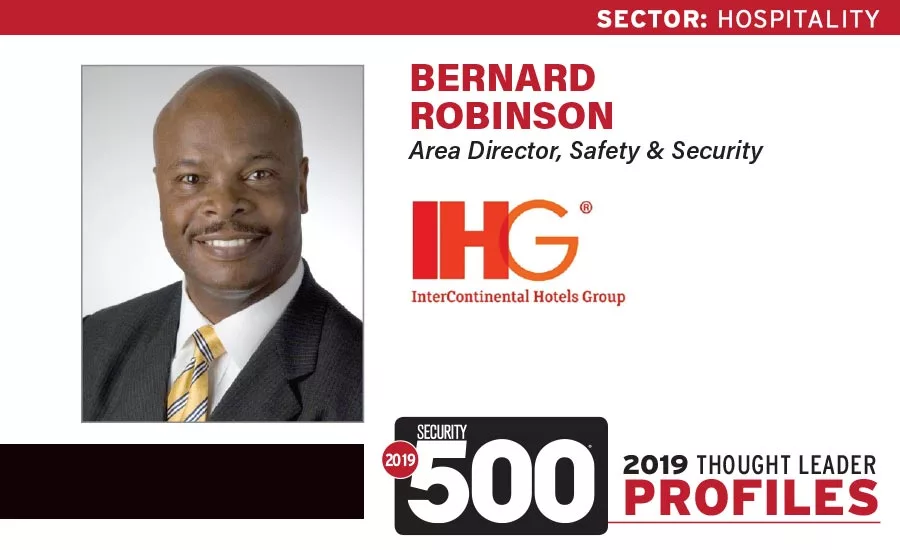Bernard Robinson: A Passion for Mentoring

Armed with a background in both military and law enforcement experience, Bernard Robinson weaved his way through a variety of roles, including homicide, SWAT, sex crimes and special ops, before a colleague told him he’d be a great leader in the hospitality sector. “At the time, I was in contracts security as an account director,” recalls Robinson. “When he told me all about hospitality, I said, ‘OK, I’ll give it a shot.’ The rest is history.”
It turns out that the hospitality sector fits Robinson quite well. “I’m a people person. The people aspect is what I really love about my job,” he says. After stints with brands like Marriot and Starwood, Robinson landed at InterContinental Hotels Group (IHG) as Area Director of Safety and Security where he oversees three of their brands in the metropolitan Washington D.C. area. Along with meeting individuals from all over the globe, he also gets to fine-tune his communication skills as he works with the different types of clientele that visit each hotel brand, whether it’s speaking with dignitary protection staff or someone on a family outing.
Making sure that he and his team are on the same page when it comes to securing properties for embassies, international delegations and dignitaries is one of the challenges Robinson faces. The team works with outside entities like the Metropolitan Police Department of the District of Columbia, the Department of Defense and the Secret Service for these stays. “What I love is that when we come toward the end, everyone’s thanking each other for their support. That’s what makes a team really perform at its best. And when you finish, you realize not many hotels have the opportunity, the skill set and the personnel to pull it off. You feel good knowing that your leadership led your team through. I always say I’m only as good as my team, so I want them to have full knowledge of everything so that in my absence they know what I expect of them. That’s tough, but when you execute it and you do it flawlessly, it’s beautiful,” says Robinson.
Keeping quality people and having to replace them when they leave is the hardest part of his job. “This industry of ours is extremely competitive, and when you get a superstar and you train them, and they work their way up to possessing all of the skill sets, talents and abilities to move on, you’re happy to tell them about an opportunity they’d be a great fit for,” says Robinson. “You’re glad for them, you want them to grow, but you know you’re not going to get someone that’s going to replace them perfectly.”
That said, Robinson does find deep satisfaction in training future leaders. “A good, quality leader is that individual that can take the average person and pull out their best skill, make them qualified, so that person becomes the next leader for tomorrow. There’s nothing like being a leader and watching those that leave the nest and go on to bigger things because, actually, they’re taking a piece of you with them, so that tells others how good you are,” he says.
For Robinson, leaving an imprint is the ultimate leadership goal. “You are the hallmark of the quality of leadership and professionalism, so when others see your team, they should be seeing bits and pieces of you complemented with individual skill sets. A person should be able to see you in Terry, you in Lisa, you in Joseph. If Terry, Lisa or Joseph are coming down the hall, the perception should be ‘I know this person is good because he trained with Bernard,’” Robinson says.
His zeal for mentoring ripples through much of what Robinson says. “Think of me like a director of a well-written screenplay. Until awards time comes, you rarely hear about Martin Scorsese. You hear about the movie, and you know based upon his history that it’s going to be quality,” he says. “When I get commendations on how someone did, I praise the individual in front of the entire team, then I speak one-on-one about things that we need to improve on in private. This makes that individual become better and better. I try to deliver quality each day I go to work because I actually do what I love, and I love my job.”
On the lighter side, Robinson is a professional artist. “I do landscape, family portraits, individual portraits. Our living room is lined with some of my artwork,” he says. “I do that as a stress reliever. My particular area of specialty is pastel, chalk and graphite, which I like because that medium reminds you of yesteryear, black and white.” He also enjoys listening to jazz, particularly live, and going on spur-of-the-moment outings with his wife.
Looking for a reprint of this article?
From high-res PDFs to custom plaques, order your copy today!





